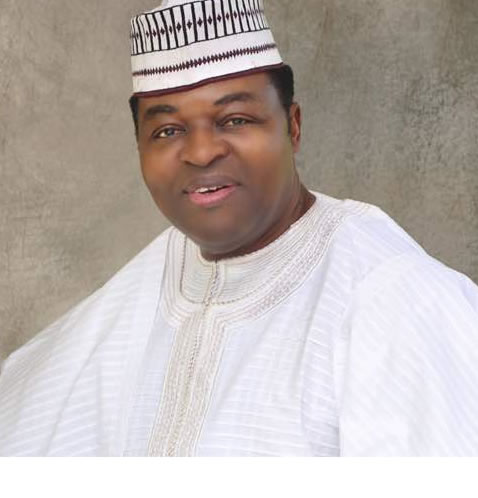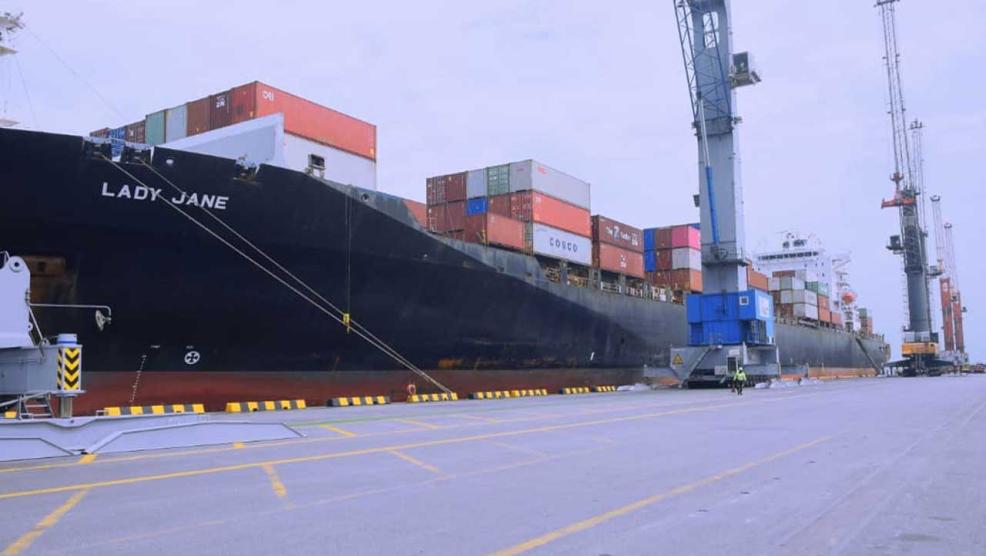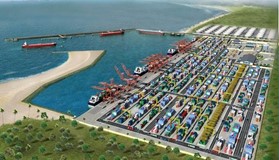
The berthing of Lady Jane at Onne was the result of favourable market forces and NPA’s ready infrastructure – Danjuma

The recent call of Mv Lady Jane, the largest container vessel ever to visit the Rivers Port Complex West Africa Container Terminal (WACT) at Onne Port, was a joyous occasion for the NAL-Comet Group. It made Chief Musa Danjuma, the Executive Chairman, to smile. Lady Jane is 295 metres long, with a draft of 12 metres and called for the first time in Nigeria at the port. According to NPA data, the vessel sailed in from the Far East, discharged 840 TEUS and loaded 1,060 TEUS, half of them agricultural commodities, including cashew nuts, sesame seed, cassia tora seed and others. Chief Danjuma attributed the feat to a combination of favourable market forces and new proactive port infrastructure and services provided by the Nigerian Ports Authority (NPA). Having paid his dues in Nigeria’s maritime sector which he joined as Executive Director of the NAL-Comet Group in the mid-1980s, Chief Danjuma’s leadership role is now more in need following the trend of stiff competition between Nigerian ports and neighbouring West African ports to clinch the patronage of big vessels such as Mv Lady Jane. Although the NAL-Comet Group started from humble beginnings as a shipping line and ship agency service provider, it added vibrant subsidiaries in other industries and sub-sectors including port terminal concession, oil and gas, electricity generation, fishing, and merchandising scattered in various cities across Nigeria. The staff strength has also grown remarkably. Since the new millennium, the group has diversified into fish-farming as well as other offshore maritime ventures in neighbouring Angola. As the Nigerian maritime and port industry grows in leaps and bounds, coupled with the challenges of global problems such as the Covid19 pandemic, the group strives to maintain its position in the market and attain new grounds. Chief Danjuma assumed the position of Executive Chairman since the early 2000s – a position as tasking as it is exciting. In this interview, he bares his mind on burning issues, locally and globally. Excerpts:
DDH: How do you explain the recent call of Mv Lady Jane to Onne Port with Comet Shipping Agencies as the port agent and the competition in the region?
Chief Danjuma: As you know, international shipping today is a competitive venture amongst ports within a geographic region. In West Africa, the leading ports are located in Lagos and neighbouring facilities at Cotonou, Lome, Tema and Abidjan, etc. Big vessels which carry large numbers of containers and other cargoes are the target of stiff competition by these ports because of their benefits such as the economies of scale in their operation, the port earnings and other commercial advantages they confer by their visits. Such big vessels also operate to the deep-sea ports. So, we are happy at her call and the fact that on her departure, half of her load were non-oil exports such as cashew nuts, sesame seeds, and casia tora seeds, thus promoting a diversified Nigerian economy. We are also happy that NPA’s new dredging efficiency for the port made it possible for Lady Jane to call there. As per the competition from other regional ports, that is the norm in a liberalized shipping market. As you know, our sister company, Five Star Logistics Ltd, receives on average about nine vessels every month. We are working hard to satisfy our customers and keep them and other port users coming for repeat calls.
DDH: The Covid19 pandemic was an ill-wind that affected all businesses. How did it impact the operations of your group of companies?
Danjuma: The Covid19 pandemic blew against all businesses in the world. At a time in 2020, as you know, all businesses were shuttered and even all cities were locked up. For us in the Comet Group, it was a stressful time as our companies are in the maritime sector which serves the global community. At such a sensitive time, new orders and regulations came into play. Some maritime nations closed their ports to foreign ships and immigrants, such as North Korea, while others, including Nigeria, introduced rigorous processes to test calling ships, their crews and cargoes for the corona virus. The Nigerian Ports Authority (NPA) exercised the latter procedure and kept Nigerian ports open for business. For example, on 27 March 2020, the NPA agreed with the Nigerian Centre for Diseases Control that 6 seafarers aboard an oil rig anchored off Lagos waters, the Siem Marlin, were infected with the corona virus. So, calling ships were screened to ensure they had spent 14 days at sea since their last port call and the health status of officers and crews were checked upon berthing. Only tankers were excepted from this rule based on their usual minimal human contact. Also, captains of ships carrying sick crew or passengers must fly two yellow flags to alert other operators, in line with IMO regulations. The NPA also suspended the charging of demurrage because of the corona virus-induced lock-downs and curfews by the Federal, State and municipal authorities which control local and interstate transportation for the delivery of goods from the ports. Many container carriers servicing the Asia-Europe-North America and Asia-Middle East-Africa routes such as Maersk Line, MSC, CMA-CGM and OOCL temporarily stopped calling at China’s export seaports for safety reasons. Thus, global cargo throughput volumes nose-dived as Nigeria did not receive any ship from China during the lock-downs. So, both our port terminal and ship agency businesses were directly affected by these disruptions.
DDH: It is fifteen years now since Fivestar Logistics Ltd started to operate the concession it won at the Tin Can Island Port. What is your assessment of how the NPA has fulfilled its part of the agreement as a landlord agency? Are there areas it needs to beef up its functions to concessionaires?
Danjuma: Fivestar Logistics Ltd operates the Ro-Ro terminal at Tin Can Island Port and has done an impressive business of receiving vehicles, containers, pipes, and other general cargoes since it began to operate the concession in 2006. The landlord, NPA, is in charge of channel services and pilotage for the ships to come to the terminal and also maintains the draught at the berths and the turning basin. I would say they have been doing a good job of that part of the concession agreement as their joint venture partner, Lagos Channel Management, is regularly doing the needful dredging jobs in the course of our operations. The access roads to the port became serious issues around 2017 when the problem resulted in the Apapa traffic gridlock blocking the smooth passage of private cars and trucks for hours and days. This caused a lot of hitches for the delivery of cargoes and the resultant port congestion was not healthy for the marketing of Nigerian ports overseas. However, the problems were being tackled now although the Tin Can Island Port to Mile Two segment of the Apapa expressway is yet to be fully repaired and restored to service. I had a few reservations about NPA’s discharge of its duty as a landlord vis-a-vis the dredging regime of the port but I would like to give the new helmsman, Mohammed Bello-Koko, a chance to prove himself going forward. Generally, it is commendable that he was picked from inside the NPA system instead of bringing a politician who did not have the prior knowledge of the organization and would need to begin learning the ropes. I believe he is competent to address problems of the industry.
DDH: Nigerian port charges are still being criticized as high. Should NPA tariffs be lowered to compete with other ports in West and Central Africa?
Danjuma: Without doubt, the competition is stiff against Nigerian ports by the rival ports along the West African coast in Cotonou, Lome, Tema, and Abidjan and one of the areas they are winning is in the area of tariffs and port charges which are very high in Nigerian ports. As you know, terminal charges are regulated by NPA, we are not free to charge whatsoever we like. We are under supervision in that area, we cannot hike our charges without reference to guidelines and the Nigerian Shippers Council also regularly intervenes to ensure fairness in our charges. But the major problem here is the NPA aspect of the port charges which is where it has to compare its rates against those charged in these West African ports to be competitive. Some of the reasons our importers prefer to go through Cotonou and Lome can be attributed to cheaper port charges and faster customs cargo release procedures. So, NPA should understand that we are in a competitive market and to capture the market, you have to win the price war by lowering your rates where necessary.
DDH: How do you see the fortunes of the Comet Group in the nearest future and what steps is the group taking to optimize the best business and financial outcomes for all stakeholders?
Danjuma: The Comet Group has come a long way. Despite the challenges foisted on the global maritime industry by the constraints of Covid19, the Comet Group is still waxing strong. Now, we are prioritizing digital skills, international collaboration and networks, managerial expertise to facilitate the activities of our principals and offering new services such as door-to-door logistics applications using emerging technologies. The world of the future belongs to digitalization and the use of big data to fast-track services, and monitor performance and system issues. We are striving in this area to enhance our service packages to customers, consignees, principals and partners as well as to explore expansion prospects. As you know, Nigeria is the engine room of the West African community and the largest economy both in the region and the continent. That should ordinarily mean abundant potential growth factors and we are leveraging on that to promote a more prosperous Comet Group for the interest of all stakeholders.
DDH: Personally, how has Covid19 affected your former liberties such as foreign travelling for business and pleasure?
Danjuma: At the personal level, I feel the same constraints and pressures as other travellers in the international scene who have to comply with quarantine, vaccination, social distancing and similar protocols devised by global health authorities to combat the Covid19 pandemic. So, yes, a lot of liberties once enjoyed in international travels are now curtailed because even the strict mask regimes enforced by airlines are discomfiting, to say the least. However, we know it is for the health and greater benefit of people on the move who cannot avoid essential business travel. So, you find that as a result of these issues a lot of physical meetings are now held virtually and only when they are unavoidable do people put up with the stress of foreign travels.

